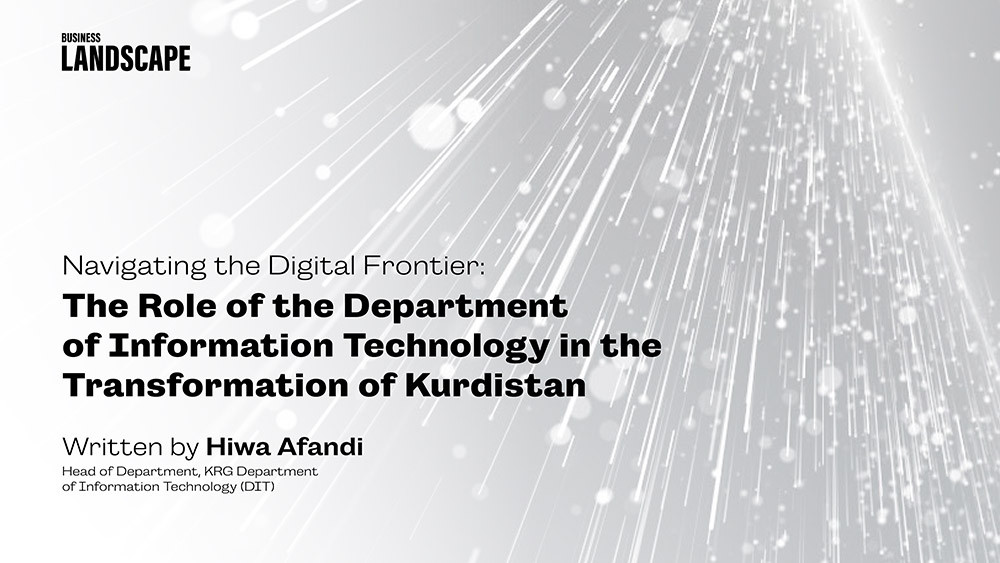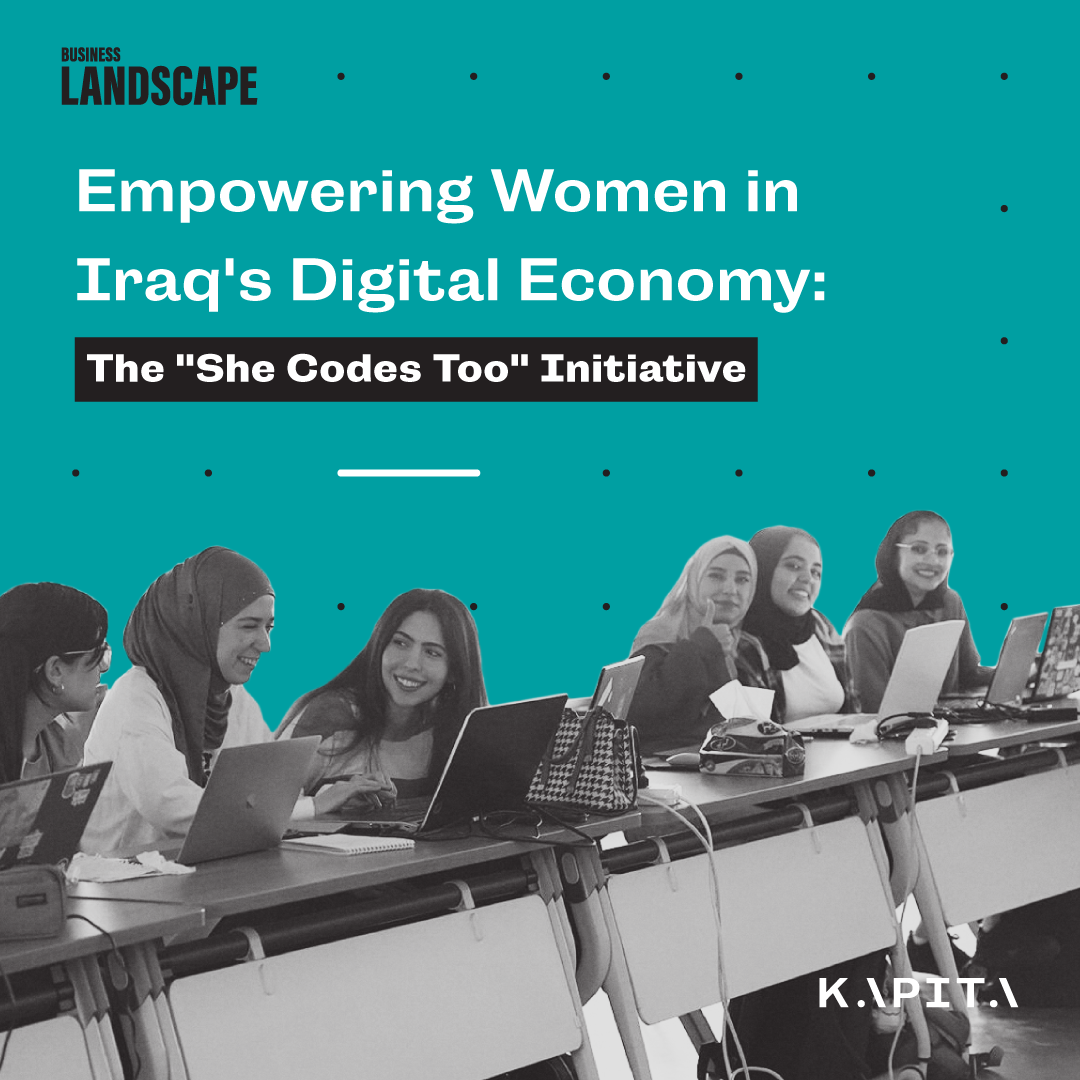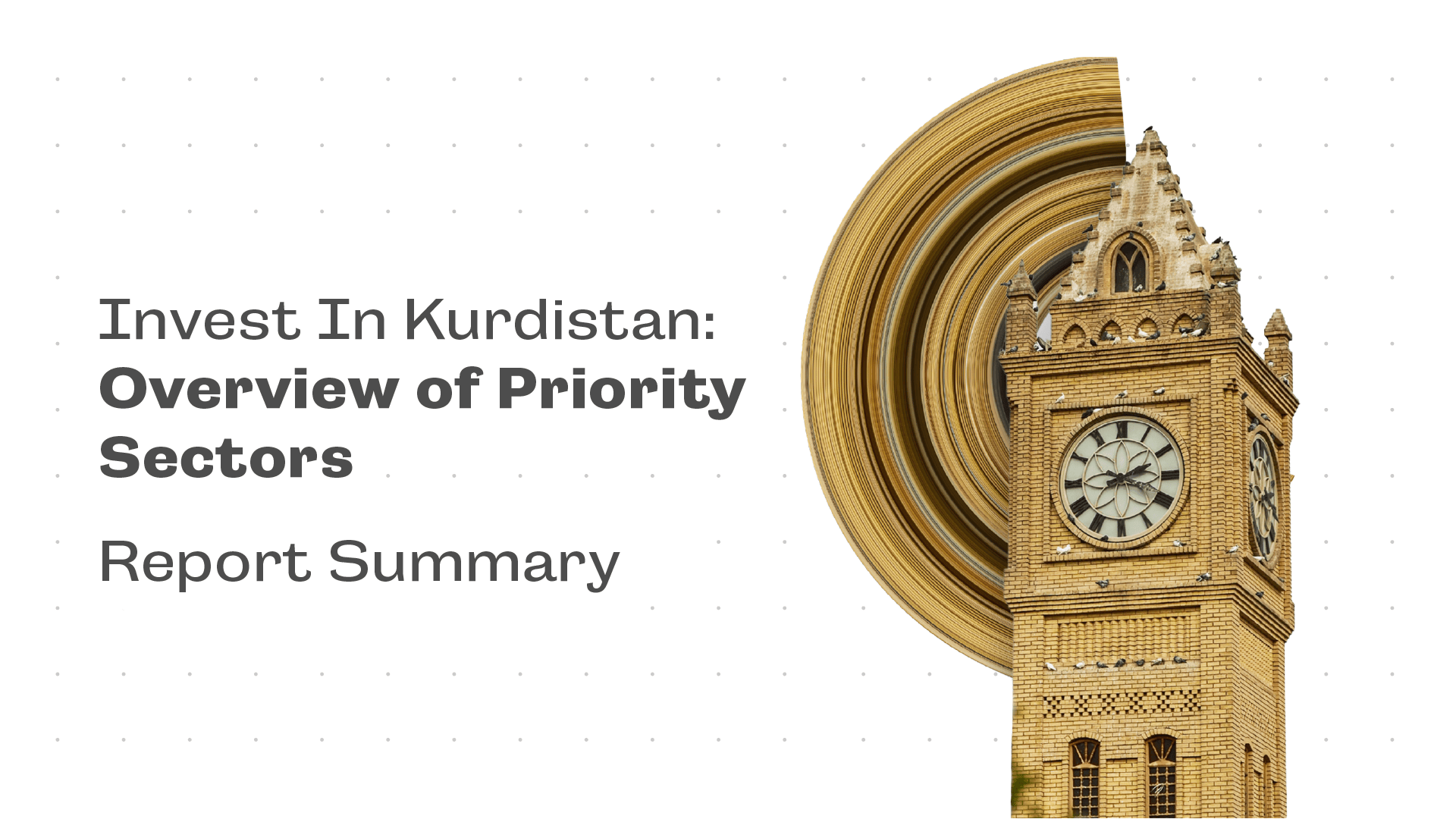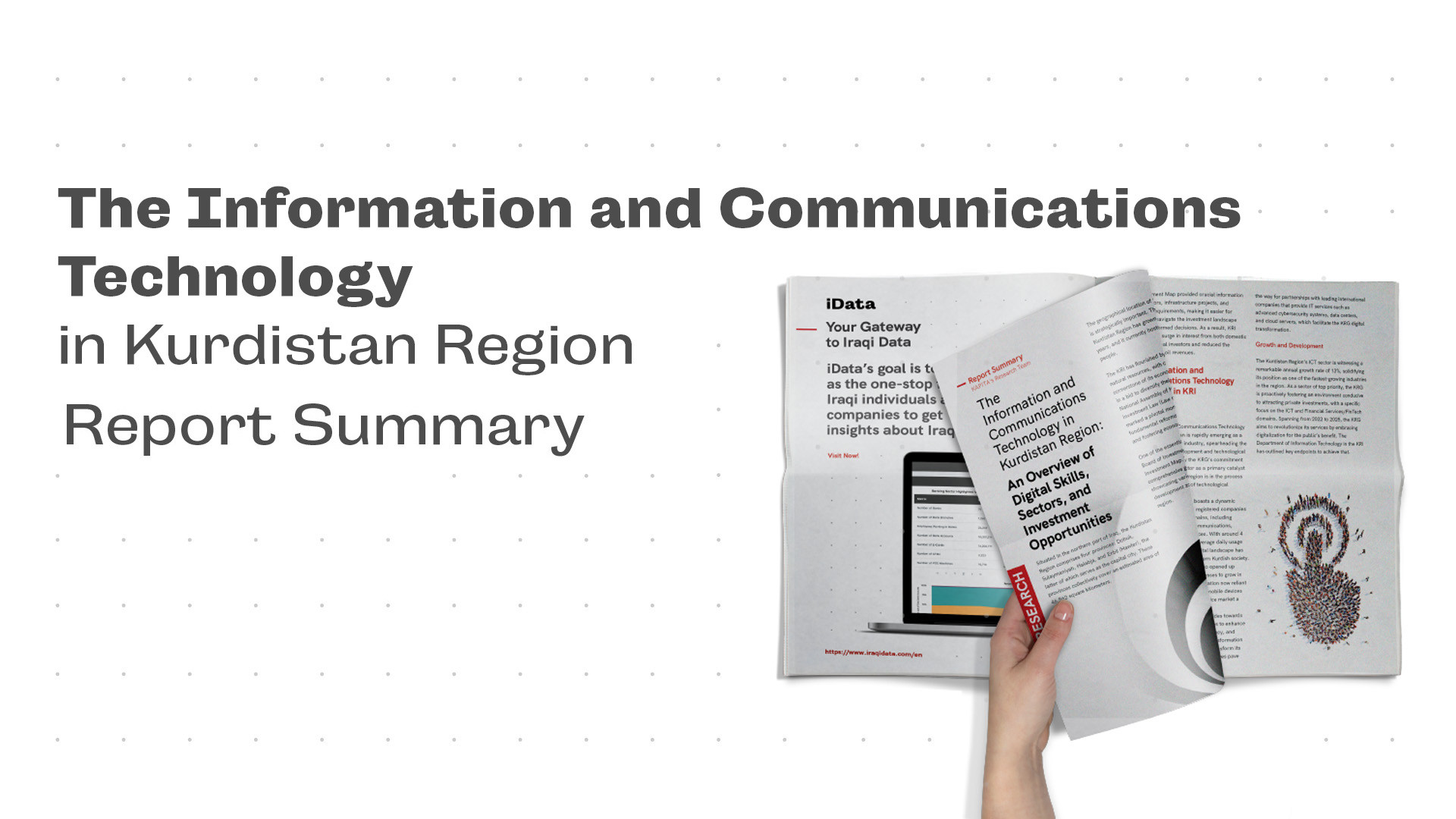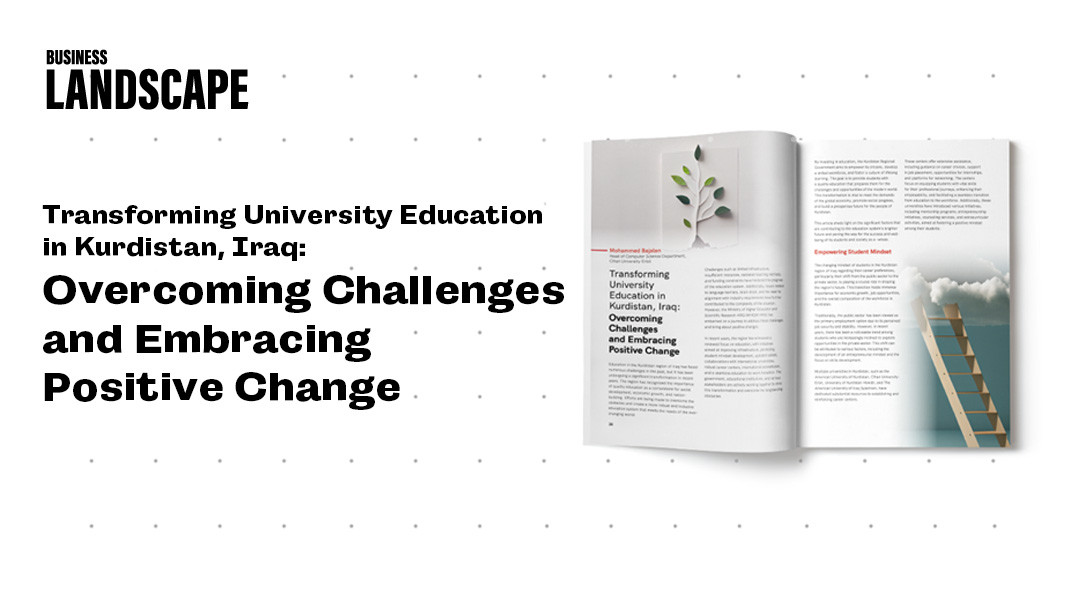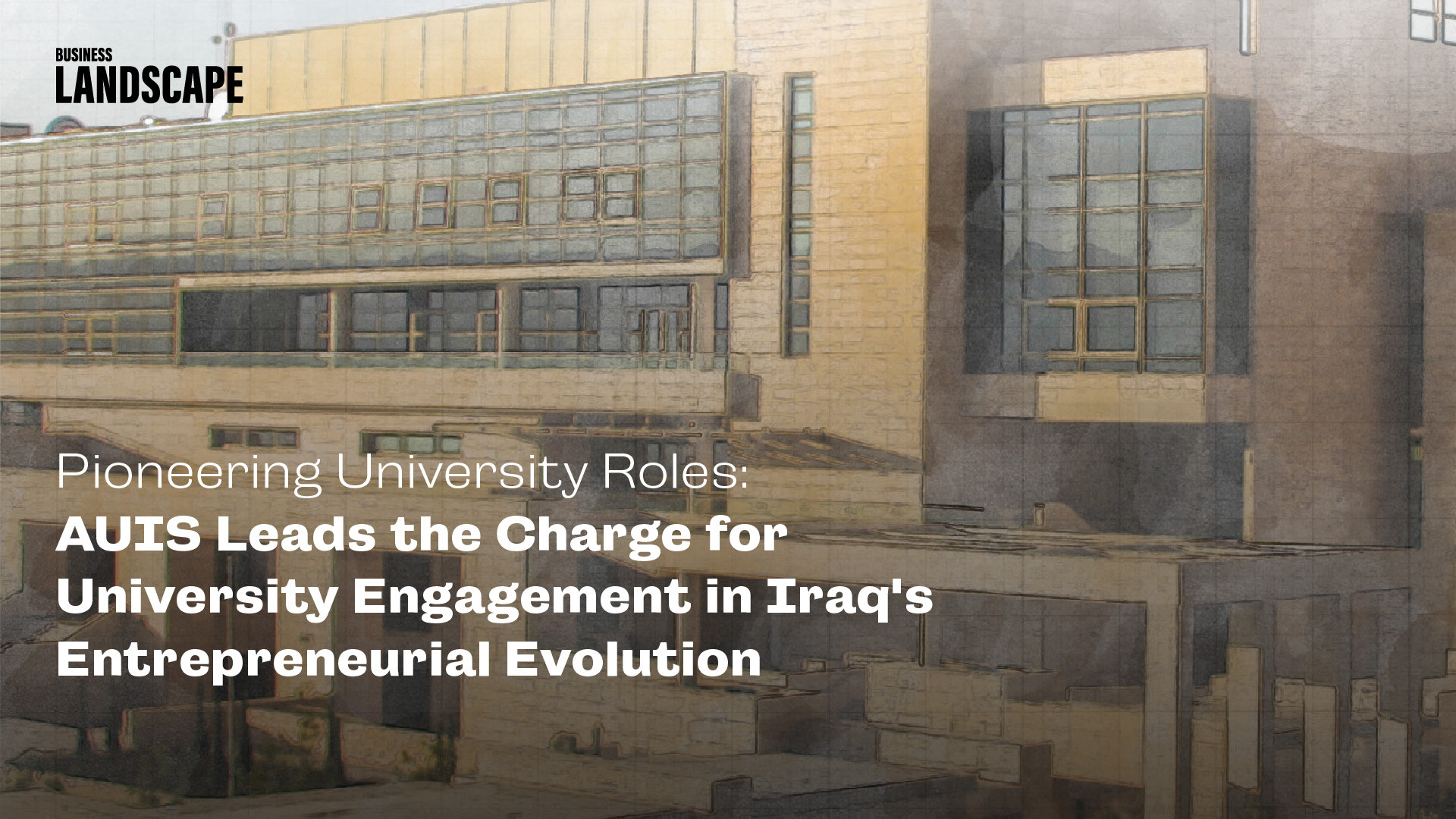Navigating the Digital Frontier: The Role of the Department of Information Technology in the Transformation of Kurdistan
Hiwa Afandi
Head of Department, KRG Department of Information Technology (DIT)
The Department of Information Technology (DIT) plays a pivotal role in the digital transformation of the Kurdistan Region. The main responsibilities are focused on empowering citizens, government, and businesses through the use of innovative information technology solutions. The department is dedicated to harnessing the power of information technology to enhance the quality of life for its citizens and promote economic growth. The multifaceted approach ensures that technology is not just a tool but an integral part of society's progress and development.
DIT’s Core Functions and Key Areas
DIT is focused on six Core Strategic Activities (CSAs), namely digital governance, digital architecture, human capital, user-centered design, security, and procurement to build the required human and digital systems capacity. The department facilitates the delivery of government services through digital platforms, enabling citizens to access essential services. This not only makes these services more accessible but also more efficient. Cybersecurity, or the protection of information and digital assets, is a priority for the Department of Information Technology. Therefore, DIT develops and implements robust security protocols to safeguard the data and privacy of citizens and institutions. It also provides digital educational and training programs to enhance the digital literacy and skills of the government workforce.
Supporting innovation and business growth is another area of focus. The DIT works closely with businesses to foster innovation and growth in the IT sector; it offers support in areas like funding, regulatory guidance, and collaboration with research institutions. The Department of Information Technology develops and enforces regulatory compliance and standards that govern the use of IT within the region. This ensures that the technology is used responsibly and in alignment with international best practices. Ensuring that accessibility and inclusion of technology is to all, regardless of their socio-economic status, is a core commitment. The department works to provide affordable and inclusive solutions that cater to the diverse needs of our population.
IT Capacity Building in the KRG
Building IT capacity in the Kurdistan Region is not just an ambition; it is a strategic mission that the Department of Information Technology is committed to fulfilling in the near future. Recognizing the immense potential and need for skilled IT professionals and digitally literate citizens, it has devised a comprehensive plan.
Key initiatives and programs are being implemented to enhance IT skills among both the workforce and the general public, with a strong emphasis on education. The Department of Information Technology (DIT) is collaborating with educational institutions to embed IT courses in the school curriculum from an early age. This proactive approach will nurture tech-savvy minds, laying a robust foundation for budding IT professionals. Furthermore, specialized vocational training centers are springing up across the region, dedicated to providing hands-on training in a range of IT disciplines. These centers aim to serve individuals looking to hone their skills for specific roles in the industry. Additionally, the DIT is deepening its engagement with universities to craft industry-relevant courses and bolster research opportunities through mutual partnerships. Such collaborations ensure that academic curricula keep pace with the dynamic needs of the IT sector. Acknowledging the pivotal role of accessibility in education, the DIT is also in the process of rolling out online learning platforms. These platforms will provide courses, tutorials, and certifications in various IT realms, enabling learners from all corners of the region to educate themselves at a pace that suits them.
The DIT places significant emphasis on corporate training and collaboration. By engaging directly with businesses, the DIT designs tailored training programs that align with the needs of the contemporary workforce. This ensures that professionals in the region possess the skills vital to compete on the global stage, particularly since the training is synchronized with industry demands. Recognizing the prevalent gender gap in the IT realm, the DIT is initiating programs specifically crafted to bolster and support "Women in Technology" initiatives, thereby fostering greater gender inclusivity in tech careers.
Additionally, the Department is proactive in its community outreach, orchestrating programs that acquaint the general public with fundamental IT skills, internet safety measures, and digital literacy. This commitment reflects the DIT's dedication to ensuring comprehensive digital inclusion. Support for startups and the nurturing of innovation are also central to the DIT's vision of a flourishing IT ecosystem. Aspiring entrepreneurs can access mentorship, funding, and a wealth of resources through the Department's innovation and entrepreneurship aids.
A robust monitoring and evaluation framework is pivotal to IT capacity building within KRG. By regularly assessing and monitoring every initiative, the DIT ensures that programs not only remain effective but also consistently resonate with its overarching objectives. Feedback from participants, stakeholders, and industry experts is invaluable, serving as the backbone of the Department's ongoing refinement and growth.
Digital Services and Applications
Several notable digital services and applications are currently available that have significantly transformed various sectors. These services are primarily directed towards demographic data and financial management within the Kurdistan Region. These systems serve to develop the related services, provide efficiency, and enhance transparency.
The Population Information System (PIS)
PIS is a core government system and the backbone of our digital data infrastructure. It facilitates the assignment of a unique digital identity to individuals residing within the borders of the Kurdistan region. To ensure the authenticity of individuals, it utilizes biometric and biographic data. A Unique Personal Number (UPN) is a 13-digit identification number that defines the holder across all interconnected government digital services.
The Kurdistan Financial Management System (KFMS)
The KFMS functions as the pivotal financial management system for the KRG, overseeing its operational expenditures in a comprehensive and paperless manner. More than 1,200 accounting units, in conjunction with all ministries and independent entities of the KRG, are integrated into the KFMS. They rely on this system to submit expenditure requests, initiate purchase orders, and document contractual agreements. Additionally, the KFMS plays a crucial role in bolstering transparency, accountability, and operational efficiency across the entirety of the government’s financial sector.
The Business Registration System (BRS)
The BRS serves as an eminent digital platform, facilitating entrepreneurs and business professionals in the seamless digital registration of their enterprises with the governmental authorities, thereby considerably reducing the required processing time. The BRS acts as the authoritative registry for all commercial endeavors within Kurdistan, ranging from expansive corporations to emerging startups and modest storefronts. Upon completion of the registration process, the BRS assigns a Unique Entity Number (UEN), which is recognized as the sole identifier for businesses across all KRG-administered systems.
This system represents a cornerstone in the digital evolution of Kurdistan's economic framework, establishing a robust base for the synchronized sharing of business data across various sectors and agencies. Furthermore, the BRS augments efficiency in interconnected domains, such as taxation. Utilizing the UEN, which also doubles as a Tax Identification Number (TIN), businesses can swiftly access and integrate information from associated systems. This not only streamlines operations but also ensures heightened clarity and transparency in such administrative undertakings.
The Citizen Complaint System (CCS)
The CCS is a sophisticated digital platform dedicated to addressing grievances. It functions as a citizen-centric interface, empowering the populace of Kurdistan to formally present their legal grievances to governmental entities and subsequently receive digital feedback in an expedited manner. All ministries and independent entities of the KRG are being integrated into the CCS to facilitate the digital reception of grievances. The CCS stands as an imperative mechanism that assists the government in fortifying vertical accountability and advancing democratic principles.
Border Control System (BCS)
The BCS manages and controls the travel in and out of the Kurdistan Region, facilitating advanced mechanisms and digital tools. Seamlessly integrating various components, the system enhances communication, thereby refining regional mobility procedures.
A pivotal feature of this system is a Visit Kurdistan portal that allows foreign nationals to apply for and obtain electronic visas for the Kurdistan Region with ease. This is complemented by an extensive tracking capability at all ports of entry/exit, which merges data from all entry and exit nodes. As a result, authorities gain invaluable insights into the movement patterns of individuals.
To enhance the efficiency of visa applications, there is a dedicated platform that collaborates with sponsors or guarantors, providing an impeccable digital interface. Finally, an advanced back office system streamlines the visa application process and provides tools to fine-tune the system's operations.
Looking ahead, there are several exciting developments on the horizon. The upcoming payroll management system holds promise for automating payroll processes and ensuring accurate and timely salary disbursements. The corporate tax system is anticipated to streamline tax-related procedures for businesses, facilitating compliance and revenue collection.
Additionally, the Haj & Umrah Portal is expected to improve the pilgrimage experience by offering digital services and information for pilgrims. These forthcoming advancements underscore the ongoing commitment to harnessing technology for efficient governance and improved public services.
The Impact of the Business Registration Platform
The business registration platform provides a full and end-to-end digital service for entrepreneurs and business professionals who are seeking to register their businesses. Both applicants and government stakeholders access the system through an online web application that is intended to manage the primary processes of registering and renewing different types of profitable businesses, such as companies, small businesses, shops, etc.
Besides the high level of convenience that the platform provides, it has also reduced the cost of registering a business from $4000 to around $150 and the time it took to register the business from months of work to 48-72 hours now.
The enhanced convenience offered by the digital system, along with its cost and time-saving benefits, has simplified the business registration process. As a result, numerous businesses are now seamlessly integrating into the ecosystem. Remarkably, despite the BRS being in operation for only a few months, the DIT has observed a significant uptick in the registration of new startups and small enterprises.
Significance of E-Visa Platform
The Visa Application Portal streamlines the visa acquisition process for travelers, allowing them to secure entry visas before their journey. This digital platform revolutionizes the visa application experience, enabling applicants to complete, pay for, and submit their forms in just under 10 minutes. With a suite of integrated tools, the portal simplifies the application process: it auto-reads details from uploaded passport images, offers real-time corrections for erroneous data, and ensures a hassle-free user experience.
Marking a significant digital milestone for Kurdistan, this is the first instance of digital payment integration being implemented for a public online service in the region. Applicants can conveniently pay their fees using their preferred credit or debit card.
The Visa Application Portal is part of a larger ecosystem called “The Border Control System,” which includes other systems that are deployed at the border crossings for passport control purposes and safeguarding Kurdistan’s border security. Since these systems are interconnected, travelers coming to the Kurdistan region do not need to show their visas to passport control officers; the passport alone suffices. A clear indicator of the success of this project is the observed surge in the number of travelers to the region, which is bringing a lot of praise to the KRG due to the ease of the visa application process via the digital portal.
The Future of Information Technology in the KRG
The Department of Information Technology's long-term vision for Kurdistan Region is rooted in our commitment to fostering a digitally inclusive, innovative, and resilient society. The DIT believes that information technology has the potential to be a catalyst for transformative change, and the department is focused on harnessing this potential to shape a promising future.
The DIT aims to build a digital economy to position the Kurdistan Region as a hub for technological innovation and entrepreneurship. The Department foresees a thriving digital economy that drives growth and creates high-value jobs by nurturing startups, attracting international tech companies, and investing in research and development. The future will see an expansion of e-government services by enhancing public services with smart solutions, utilizing AI, big data, and other cutting-edge technologies to make public services more responsive, personalized, and efficient. Emphasizing environmental stewardship, the department plans to promote sustainable technology practices and implement sustainable technologies that align with global sustainability goals, reducing the environmental footprint of our digital advancements.
In addition, the department aims to invest in healthcare and education technology as it envisions a strong focus on leveraging technology in healthcare and education, providing more accessible and quality services that elevate the overall well-being of our citizens. Additionally, the department’s vision encompasses a society where every individual is equipped with the necessary digital skills by empowering citizens through digital literacy. It plans to expand educational programs, providing resources and training that empower citizens to fully participate in the digital world.
As we advance technologically, the DIT will continue to enhance its cybersecurity measures with robust cybersecurity frameworks, ensuring that our digital landscape remains secure and trustworthy. The department seeks to increase connectivity in rural areas. Therefore, its vision includes bridging the urban-rural digital divide, ensuring that the benefits of technology reach even the most remote parts of the region. Moreover, it aims to establish the Kurdistan Region as a collaborative partner in the global tech arena, fostering global collaboration and engaging in cross-border initiatives and partnerships that contribute to the worldwide technological ecosystem.
Our long-term vision is to create a dynamic and inclusive digital society that leverages technology as a tool for socioeconomic development, innovation, and improved quality of life. The Department of Information Technology believes that the strategic application of information technology will not only shape the Kurdistan Region's economy but also enhance the overall well-being of its people. Through collaboration, education, innovation, and responsible governance, it aspires to lead our region into a prosperous and digitally empowered future.
